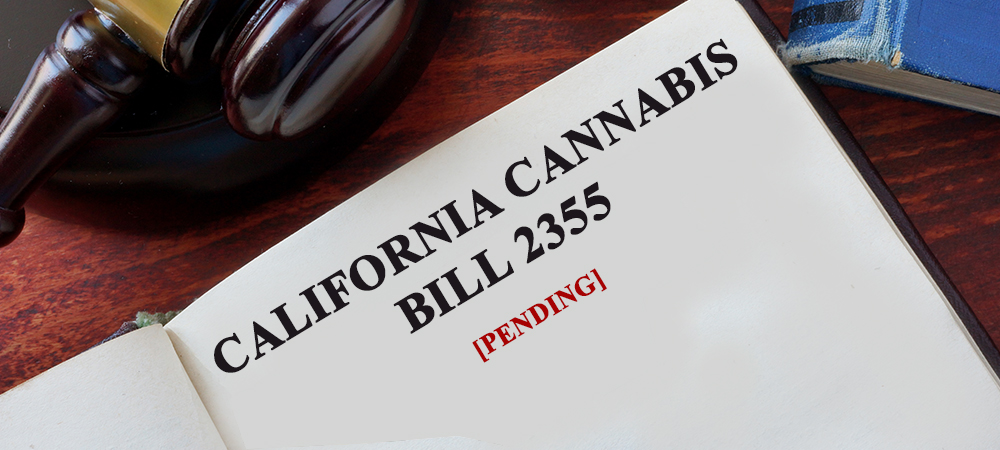Evolution Of California Cannabis Law – Pending Bill Considered By The Legislature: Assembly Bill 2355
On February 18, 2020 Assembly Member Rob Bonta introduced AB 2355, which seeks to amend California Fair Employment and Housing Act to require employers to provide “reasonable accommodations” to workers with a doctor’s recommendation to use medical cannabis.
AB 2355
The California Fair Employment and Housing Act protects the rights of all persons to seek, obtain, and hold employment without discrimination on account of various personal characteristics, including medical condition. The act prohibits various forms of employment discrimination, including discharging or refusing to hire or to select for training programs on a prohibited basis, and empowers the Department of Fair Employment and Housing to investigate and prosecute complaints alleging unlawful practices.
Under existing law, the Compassionate Use Act of 1996, a patient or a patient’s primary caregiver who possesses or cultivates marijuana for personal medical purposes upon the written or oral recommendation or approval of a physician is not subject to conviction for offenses relating to possession and cultivation of marijuana. Existing law requires the State Department of Public Health to establish a voluntary program for the issuance of identification cards to qualified patients who are entitled to the protections of the act.
This bill would make it an unlawful employment practice for an employer or other entity to refuse to hire or employ a person, to refuse to select a person for a training program leading to employment, to bar or to discharge a person from employment or from a training program leading to employment, or to discriminate against an employee, because of the employee’s status as a qualified patient, or as a person with an identification card, as specified, for purposes of medical cannabis, subject to certain exceptions. The bill would grant people who use medical cannabis while employed the same rights to reasonable accommodation and the associated interactive process as are provided to workers prescribed other legal drugs under this section, subject to specified requirements.
The bill would prohibit these provisions from being interpreted as prohibiting employers from refusing to hire an individual, or from discharging or reasonably accommodating an employee, who is a qualified patient or person with an identification card for purposes of medical cannabis, if doing so could reasonably cause the employer to violate, lose a monetary or licensing-related benefit, or incur damages under federal law or regulations, as specified. The bill would exempt an employer from these provisions if the employer requires all employees and job applicants to be drug and alcohol free for legitimate safety reasons as required by federal or state laws and who are required to conduct applicant and ongoing testing of employees by those laws and regulations. The bill would also prohibit the employee protections described above from being construed as diminishing an employer’s ability to terminate an employee, refuse an accommodation, suspend an employee, or take any other lawful action against the employee if the employer discovers that the employee is using or impaired by medical cannabis on the property or premises of the place of employment or during the hours of employment. The bill would allow an employer to utilize impairment testing before or during work in addition to other measures to determine if an individual is impaired and allow the information provided by the test to be considered in conjunction with other considerations in determining reasonable accommodation.
Assembly Member Bonta stated “To be discriminated against by your employer because of the type of medicine you use is both inhumane and wrong. Medical cannabis, as recommended by a doctor, should be given a similar “reasonable accommodation” as all prescription drugs. This is a question of equity and protecting patients who face illnesses likes cancer, epilepsy, and chronic pain against needless workplace discrimination. This issue is even more pressing as we face the ongoing and deadly opioid epidemic because medical cannabis can be a less addictive option. Currently, 16 states have extended similar worker protections and it’s time for California to do the same.”
Even though 33 states have legalized cannabis for medical or adult use and 16 states have extended such worker protections as advocated by Bonta (those states being Arizona, Arkansas, Connecticut, Delaware, Illinois, Maine, Massachusetts, Minnesota, Nevada, New Jersey, New Mexico, New York, Oklahoma, Pennsylvania, Rhode Island and West Virginia), banks and financial institutions are hesitant to provide services to cannabis businesses because federal law still classifies cannabis as an illegal Schedule 1 drug under the Controlled Substances Act.
Higher Federal Taxes Still Remain
While the development listed above is favorable for California cannabis business, it still remains to be seen when favorable changes will be made to the Internal Revenue Code which treats businesses in the marijuana industry differently resulting in such business paying at least 3-times as much in taxes as ordinary businesses.
Generally, businesses can deduct ordinary and necessary business expenses under I.R.C. §162. This includes wages, rent, supplies, etc. However, in 1982 Congress added I.R.C. §280E. Under §280E, taxpayers cannot deduct any amount for a trade or business where the trade or business consists of trafficking in controlled substances…which is prohibited by Federal law. Marijuana, including medical marijuana, is a controlled substance. What this means is that dispensaries and other businesses trafficking in marijuana have to report all of their income and cannot deduct rent, wages, and other expenses, making their marginal tax rate substantially higher than most other businesses.
Federal Reporting Of Cash Payments Still Remain
The Bank Secrecy Act of 1970 (“BSA”) requires financial institutions in the United States to assist U.S. government agencies to detect and prevent money laundering. Specifically, the act requires financial institutions to keep records of cash purchases of negotiable instruments, and file reports of cash purchases of these negotiable instruments of more than $10,000 (daily aggregate amount), and to report suspicious activity that might signify money laundering, tax evasion, or other criminal activities. The BSA requires any business receiving one or more related cash payments totaling more than $10,000 to file IRS Form 8300, Report of Cash Payments Over $10,000 Received in a Trade or Business.
The minimum penalty for failing to file EACH Form 8300 is $25,000 if the failure is due to an intentional or willful disregard of the cash reporting requirements. Penalties may also be imposed for causing, or attempting to cause, a trade or business to fail to file a required report; for causing, or attempting to cause, a trade or business to file a required report containing a material omission or misstatement of fact; or for structuring, or attempting to structure, transactions to avoid the reporting requirements. These violations may also be subject to criminal prosecution which, upon conviction, may result in imprisonment of up to 5 years or fines of up to $250,000 for individuals and $500,000 for corporations or both.
Marijuana-related businesses operate in an environment of cash transactions as many banks remain reluctant to do business with many in the marijuana industry. Like any cash-based business the IRS scrutinizes the amount of gross receipts to report and it is harder to prove to the IRS expenses paid in cash. So it is of most importance that the proper facilities and procedures be set up to maintain an adequate system of books and records.
How Do You Know Which Cannabis Tax Attorney Is Best For You?
Given that cannabis is still illegal under existing Federal law you need to protect yourself and your marijuana business from all challenges created by the U.S. government. While cannabis is legal in California, that is not enough to protect you. It’s coming down that the biggest risk is TAXES. Be proactive and engage an experienced Cannabis Tax Attorney in your area. Let the tax attorneys of the Law Offices Of Jeffrey B. Kahn, P.C. located in Orange County, Inland Empire (Ontario and Palm Springs) and other California locations protect you and maximize your net profits. Also, if you are involved in crypto currency, check out what a Bitcoin Tax Attorney can do for you.








